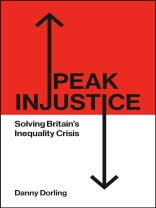By 2024 a majority of parents in the UK with three or more children were going hungry to feed their families. Children in the UK are becoming shorter and childhood mortality has been rising. What part does living with high inequality play in understanding how we have got to the point of peak injustice, when surely the situation cannot become worse?
Although 2018 was a year of peak income and wealth inequality in the UK, absolute deprivation has continued to grow since then, especially after the pandemic.
Peak Injustice follows up the best-selling Peak Inequality (2018), offering a carefully curated selection of Danny Dorling’s latest published writing with brand new content looking to the future, including challenges for a new government in 2024/25, the impact of Jeremy Corbyn’s legacy, and the implications of Keir Starmer’s many blind spots.
An essential addition to readers’ Dorling collections.
สารบัญ
Introduction – Britain’s inequality crisis
Section 1: The politics of hope
The inequality crisis: how did you not see me?
1.1 On Jeremy Corbyn
1.2 Would you let Boris Johnson drive your daughter home?
1.3 The curve of inequality and the Brexit Way
1.4 So, how did we end up with this government?
1.5 Osborne, Johnson and Starmer: let them eat growth?
1.6 A tale of three elections: Sweden, Italy and England
1.7 What the UK in 1922 and in 2017 had in common
1.8 Are things about to get better?
Section 2: Poverty, destitution and happiness
Anxiety, satisfaction, worth and happiness
2.1 Who spends more wisely: individuals or government?
2.2 Dying quietly: English suburbs and the stiff upper lip
2.3 The wreckers who tore British society apart
2.4 Austerity, not influenza, caused the UK’s health to deteriorate
2.5 The income shock of 2020: a jolt in the fall after peak inequality
2.6 The roundabout: class hate in England
2.7 Why Finland is still the happiest country in the world
2.8 Most people in the UK now share Robert Owen’s views
2.9 A majority of people think the government does too little
2.10 The crises combine: austerity, the cost of living, jobs and pay
Section 3: Levelling across housing
We will finish what we started
3.1 When everyone you know buys art
3.2 Short cuts on homelessness
3.3 How to solve the housing crisis
3.4 Public spending in the UK and Europe
3.5 House prices: welcoming a crash
3.6 A letter from Helsinki
3.7 Liz Truss and autumn 2022
3.8 Labour and levelling up
Section 4: Eugenics and the fear of too many people
Eugenics and population control
4.1 The blank slate
4.2 When racism stopped being normal
4.3 About our schools
4.4 The birth of Baby Eight Billion
4.5 History repeating
Section 5: How austerity undermined our public health
Counting the cost of austerity
5.1 How austerity caused the NHS crisis
5.2 The Brexit vote, declining health and immigration
5.3 How many more will be dead by Christmas?
5.4 The decimation of the NHS
5.5 Falling down the global ranks
5.6 Our museum future
Section 6: Hope, the elite and change
Yesterday, tomorrow – and hope
6.1 What would it take to persuade Rishi Sunak to join the Patriotic Millionaires?
6.2 Kindness: rigour for British Geographers
6.3 The stones of the University of Oxford
6.4 Economics and compassion
6.5 Finland: how much better life can be
6.6 Dyslexia and the problem with pride
Conclusion: What ten things can we do?
เกี่ยวกับผู้แต่ง
Danny Dorling is Halford Mackinder Professor of Geography at the University of Oxford and a Fellow of St Peter’s College. He is a patron of Road Peace, Comprehensive Future and Heeley City Farm. He has published over 50 books, including the best-selling Peak Inequality: Britain’s Ticking Timebomb (2018) and Injustice: Why Social Inequality Still Persists (2014)..












